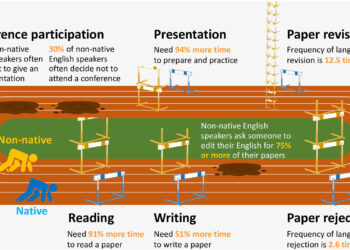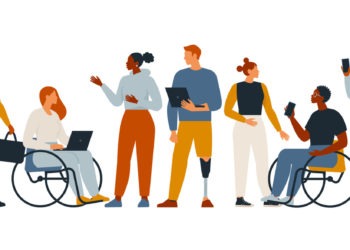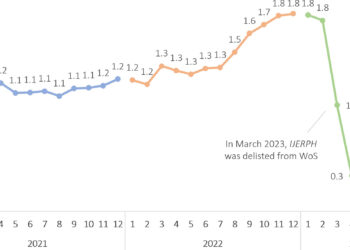Editor’s Note: Today’s post is by Randy Townsend. Randy Townsend, MPS, (he, him, his) is President of the Society for Scholarly Publishing (SSP) and has served in leadership positions for the Council of Science Editors, and AM&P Network’s Association Council, and has co-chaired DEIA Committees for AM&P Network and SSP. He has actively supported C4DISC and contributed to the development of many of their freely available resources. At Origin Editorial, Randy takes innovative approaches to lead and implement peer review strategies. Randy was the inaugural Editor in Chief for the GW Journal of Ethics in Publishing and is an Associate Professor of the MPS in Publishing program in the College of Professional Studies at George Washington University.
Earlier this year, I learned of the passing of a childhood friend’s brother from a social media post. I expressed my condolences and left him and his family to grieve. Less than six months later, in another post from that same friend, I learned that his son had also passed. I reached out in sadness and disbelief only to learn that both his brother and son were lost to completed suicide. My friend is a family man: loving, hardworking, and present. Somehow, something was missed.
I reflected heavily on my friend and the subtle and overt signs of mental health triggers while I was preparing for my term as Society for Scholarly Publishing (SSP) President. As a community, we are friends and colleagues, mentors and volunteers, competitors and collaborators, aligned in our values, defined by our actions. In many ways, I hope that I am like my friend: a family man, loving, hardworking, and present. In my role as President, I saw an opportunity to start a conversation around mental health. It’s a difficult topic, not one that I’ve seen traditionally discussed within the context of scholarly publishing, so I struggled with how to raise it and how it would be received.

The World Health Organization (WHO) says that mental health is a state of mental well-being that enables people to cope with life’s stresses, realize their abilities, learn and perform well, and contribute to their community. The importance of normalizing this conversation within the SSP community seems to be revealed when you begin to unpack the data.
According to an article published in JAMA Health Forum in August, telehealth visits for mental health increased by more than 1000% from 2019-2022; overall mental health service utilization is nearly 40% higher than before the pandemic.
Generally speaking, one factor that has affected (typically negatively) our mental health was the abrupt transition from in-person professional environments to a more dispersed working culture — something which most of us have experienced in the past few years. In the 2021 Harvard Business Review article, “Employees Are Lonelier Than Ever. Here’s How Employers Can Help,” loneliness is described as the invisible enemy that can lead to health problems, reduced productivity, turnover, and burnout. U.S. Surgeon General Dr. Vivek Murthy calls this a crisis. Following his report, “Our Epidemic of Loneliness and Isolation”, he said,
Our epidemic of loneliness and isolation has been an underappreciated public health crisis that has harmed individual and societal health. Our relationships are a source of healing and well-being hiding in plain sight – one that can help us live healthier, more fulfilled, and more productive lives.
Burnout also plays a significant role in mental health. According to business.com, burnout results in decreased productivity, high turnover rate, low employee engagement, and negative health impacts. A 2022 AFLAC study revealed that 59% of American workers say they are experiencing some level of burnout, 9% higher than what was self-reported in 2021.
September is Suicide Prevention Month, adding an extra weight to the importance of these considerations, especially as I think of my friend and his family. The National Alliance on Mental Illness (NAMI) reports that “46% of people who die by suicide had a diagnosed mental health condition — but research suggests that 90% may have experienced symptoms of a mental health condition.”
In my remarks at SSP’s annual meeting this year, I stated that I didn’t want to wait until tragedy finds its way into our community before speaking about the importance of mental health awareness. It wasn’t long before I realized that this IS a conversation that our community needs — and wants — to have and that this IS the right time. The volume of messages, chats, notes, and private, very personal conversations that I received was reaffirming, and I thank each and every one of you for having the confidence and trust in me to be vulnerable.
I want to express my sincere gratitude for one group in particular. Immediately following the annual meeting, I extended an invitation to all of the active SSP Past Presidents to join me in brainstorming the possible ways that SSP can and should support our community members. I was truly humbled by the unanimous display of respect and solidarity demonstrated in that session, where many shared stories about their own direct or indirect mental health experiences. That group became the SSP Mental Health Task Force, and they have been actively navigating these difficult and delicate conversations throughout the past three months with unwavering commitment.
Collectively, we drafted a formal charge for the Task Force, as follows:
Given the impact of employee mental health on organizations, SSP Past Presidents were convened to consider ways in which SSP as a society can and should support the mental health of members, with work-related issues being the primary but not the only focus. The goal of this Task Force is to identify potential opportunities, activities, resources, and initiatives. The Mental Health Task Force will present their recommendations to the SSP Board in October.
Over the past three months, the Task Force narrowed more than 20 ambitious initial ideas down to five practical initiatives to support mental health awareness for SSP members. Several are already in motion, including one to publish more information and perspectives on mental health issues here in The Scholarly Kitchen. As we continue to develop these initiatives, I hope that they will serve to strengthen relationships, reinforce our core values, and offer threads to keep us actively connected. Please join the conversation, participate in the activities, and share your voice.
Discussion
9 Thoughts on "Guest Post – SSP Assembles Presidential Task Force to Prioritize Mental Health Awareness and Support Within the Scholarly Communications Ecosystem"
thanks Randy for you vision, leadership and focus on this important topic, I look forward to supporting you, and working together with the broader community on this critical matter.
Thank you, Adrian. I’m grateful for your support and contributions throughout these past few months.
Randy, I cannot love this post enough! Thank you for sharing. I am sorry for your loss. This is such an important conversation. Looking forward to more word from this Task Force.
While the intent is wonderful, it is a pity that, given the many pressing issues impacting mental health, working from home is given such prominence in this piece. The data that is referenced is from a report from the Integrated Benefits Institute (IBI). The board and membership of the organization do not include health care providers, clinical researchers, or patients.
Randy, many thanks for your leadership! I am so honored to be included in this important initiative.
Thank you, Randy, for spearheading this critically important endeavor. I look forward to hearing more about the initiatives.
Thank you, Randy — this is such an important initiative which I support with a whole heart. One point of clarification is that you said you “didn’t want to wait until tragedy finds its way into our community before speaking about the importance of mental health awareness,” but the truth is that tragedy has already found its way into our community. It’s a part of every community. That’s why this initiative is so important: it’s already here, it has been here, and — while we can and should do all we can as members of this community to prevent it from being so — it will continue to be. Initiatives like this are absolutely vital to fostering and providing structures, forums, and real actions of support, compassion, and care. I’m looking forward to learning more from you and the task force here in this space, and to being a part of the solution.
Thank you Randy for your leadership on this. I’m so sorry to hear the heartbreaking story of your friend’s losses. Lizzie Gadd gave a very moving talk at the ALPSP conference last week, about the effects of researcher assessment norms on researchers’ mental health. She shared some very moving stories of researchers who had been driven to suicide by a sense of failure that they couldn’t meet evaluation criteria. It was an unignorable reminder of the responsibilities we all hold to consider mental health. It is great to be setting up a task force to help us all here. Thank you.
Thank you for sharing your story of loss by suicide, Randy. It’s important the conversation continues about mental health issues.



